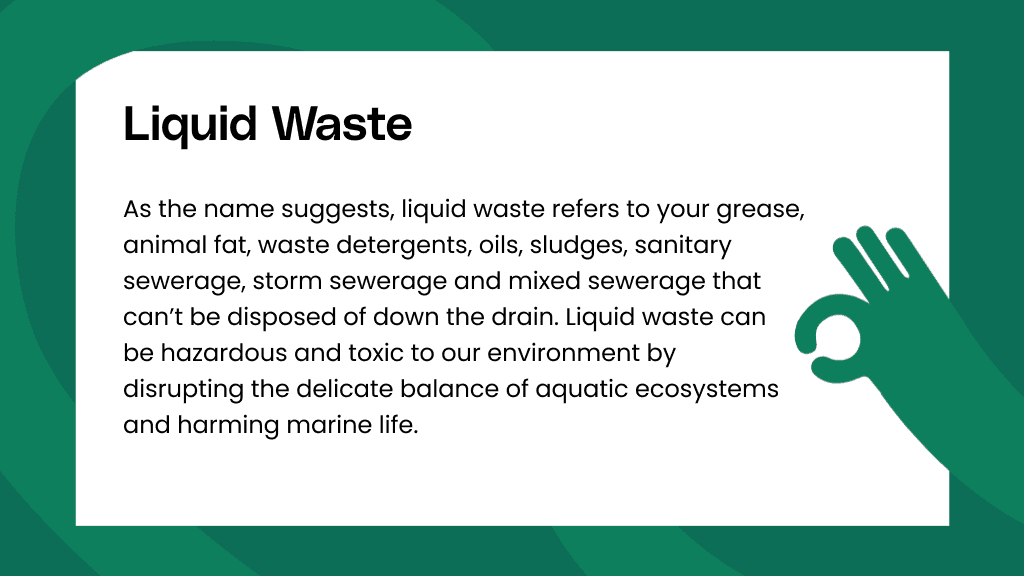About Reclaim Waste
About Reclaim Waste
Blog Article
The 5-Minute Rule for Reclaim Waste
Table of ContentsReclaim Waste Things To Know Before You BuyThe 7-Second Trick For Reclaim WasteReclaim Waste Fundamentals ExplainedThe 3-Minute Rule for Reclaim WasteReclaim Waste Can Be Fun For Everyone
Residential sewage waste refers to the waste and items from a domestic septic tank. The appropriate administration and disposal of domestic sewage waste call for liquid waste to be moved to a sewage therapy plant where the proper methods and equipment are applied to purify and dispose of waste.
Business waste frequently includes possible risks, such as flammable materials or a mix of fluid and solid waste items, and requires a much more innovative and in-depth disposal process. The disposal of commercial waste typically entails the filtering of waste before transport to make sure risk-free and appropriate disposal. Industrial waste is produced from by-products and runoff of commercial procedures and manufacturing.
This type of waste can not use the very same sewage management transportation or processes as septic or industrial liquids. The hazardous waste administration process needs the examination and screening of fluid waste prior to it undertakes the disposal procedure (liquid waste removal). Drainage waste is the fluid waste that originates from overflow and excess stormwater in extremely inhabited areas or cities
Runoff waste can cause contamination and flooding if not handled correctly. Discover more regarding sewage system cleansing and waste management. Making sure correct waste monitoring can avoid catastrophes and lower environmental harm. Both people in household setups and professionals in industrial or production industries can benefit from recognizing the processes and policies of fluid waste management.
Not known Details About Reclaim Waste
Contact PROS Providers today to find out concerning our waste administration and disposal solutions and the proper methods to care for the liquid waste you generate.
(https://www.imdb.com/user/ur191403836/?ref_=nv_usr_prof_2)This so-called 'wastewater' is not only an essential resource however, after therapy, will be launched to our land, waterways or the ocean. Made use of water from toilets, showers, bathrooms, kitchen sinks, laundries and commercial processes is known as wastewater.

water used to cool down equipment or tidy plant and devices). Stormwater, a form of wastewater, is overflow that flows from farming and urban areas such as roofs, parks, yards, roadways, paths and rain gutters into stormwater drains, after rainfall. Stormwater moves without treatment directly to regional creeks or rivers, at some point getting to the sea.
The Buzz on Reclaim Waste
In Queensland, a lot of wastewater is dealt with at sewer treatment plants. Wastewater is transported from residential or commercial websites with a system of drains and pump terminals, referred to as sewage reticulation, to a sewage therapy plant. Regional governments develop, maintain and operate most sewage treatment plants. Operators are certified under the Environmental Management Act 1994 to discharge treated wastewater at an acceptable environmental standard into rivers.
The Division of Natural Resources encourages city governments about handling, operating and preserving sewerage systems and therapy plants. In unsewered locations, regional governments may call for homeowners to set up private or home sewage therapy systems to deal with domestic wastewater from bathrooms, kitchen areas, bathrooms and laundries. The Department of Natural Resources authorizes the usage of family systems when they are confirmed to be efficient.
In some brand-new neighborhoods, therapy of some stormwater to eliminate litter, sand and crushed rock has started using gross toxin traps. Wastewater treatment takes place in 4 phases: Eliminates strong matter.
Makes use of tiny living organisms understands as micro-organisms to damage down and get rid of remaining dissolved wastes and fine bits. look at this now Micro-organisms and wastes are incorporated in the sludge.
An Unbiased View of Reclaim Waste
Nutrient elimination is not available at all sewer treatment plants because it requires pricey specialised equipment. Clear fluid effluent generated after treatment may still contain disease-causing micro-organisms - liquid waste removal.

Most wastewater moves right into the sewerage system. Under the Act, local governments carry out authorizations and permits for eco relevant tasks (ERAs) entailing wastewater releases that could have a neighborhood influence.
Reclaim Waste Things To Know Before You Buy
Tracking supplies valid details concerning water top quality and can validate that licence conditions are being met. The information obtained through monitoring offers the basis for making water quality decisions.
Report this page